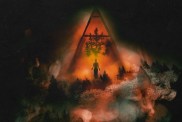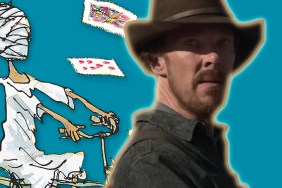Cast:
Ralph Fiennes as M. Gustave
Tony Revolori as Zero Moustafa
Saoirse Ronan as Agatha
Edward Norton as Henckels
Willem Dafoe as Jopling
Adrien Brody as Dmitri
Jeff Goldblum as Kovacs
Jude Law as Young Writer
F. Murray Abraham as Mr. Moustafa
Tilda Swinton as Madame D.
Léa Seydoux as Clotilde
Bill Murray as M. Ivan
Owen Wilson as M. Chuck
Jason Schwartzman as M. Jean
Harvey Keitel as Ludwig
Mathieu Amalric as Serge
Florian Lukas as Pinky
Gabriel Rush as Otto
Karl Markovics as Wolf
Tom Wilkinson as Author
Bob Balaban
Directed by Wes Anderson
Story:
High up in the hills of the Swiss Alps is the Grand Budapest Hotel, a majestic place with a long history and a past in which the hotel’s manager Mssr. Gustave (Ralph Fiennes) and the lobby boy Zero (Tony Revolori) were involved with a dispute over ownership of the place after the murder of the elderly benefactor Madame D. (Tilda Swinton), who many suspect that Gustave had an affair with.
Analysis:
It’s possible every Wes Anderson fan has a different favorite movie of his, and no one will ever fully agree whether “Rushmore” or “Moonrise Kingdom” or something else should be considered his current apex. Regardless of how you feel about his style of filmmaking, most Wes Anderson films are met with some degree of expectations, a certain level of curiosity and anticipation of how his well-documented quirks and connections to past work will crop up in what will likely be a unique and original premise.
With “The Grand Budapest Hotel,” the cast line-up on the posters will make one assume this is Anderson pulling together a “supergroup” from his past seven films, and they’d be wrong. In fact, it’s the characters played by three Anderson first-timers that drives the movie, something that will immediately help spare it from immediate comparisons.
After an opening prologue with the author of the book “The Grand Budapest Hotel”–something completely unnecessary to the rest of the movie, mind you–the perspective shifts to Jude Law’s author looking for a getaway at the mostly vacant (and frankly, quite pathetic) Alps resort of the title and meeting the elderly owner Mr. Moustafa (F. Murray Abraham) who tells him his story and that of the previous owner.
Now, usually when you start out with flashbacks within flashbacks, you’re just asking for trouble, but this really is the story of Moustafa and his mentor and hotel owner Mssr. Gustave, played by Ralph Fiennes, their relationship and how very specific events nearly fifty years earlier changed both their lives. Establishing the setting and introducing this relationship is probably the most Wes Anderson the movie gets and it’s somewhat painstaking for anyone worried it’s just going to be more of the same. But what the opening act does beautifully is give us a sense of Gustave and that is what is going to keep his invested in his journey, however ridiculous it may seem to get later on.
That said, the plot only starts moving forward when Madame D.–Tilda Swinton aged with a ton of make-up–suddenly passes away, allegedly murdered, and there’s a dispute over her will, the ownership of the hotel but especially a valuable painting called “Boy with an Apple” which she passed onto Gustave, who also happens to be the main suspect in her death. There are obviously a few unhappy campers in the family including Adrien Brody’s Dimitri and an investigator/enforcer played by Willem Dafoe. From there, it turns into a straight-up noir murder mystery and it’s where things really start to get fun as they break away from what we might expect from a Wes Anderson film.
This comes part and parcel with the highly entertaining portrayal of Gustave by Ralph Fiennes, an almost Oscar Wilde-like character, not necessarily flamboyant but eloquent and witty, just a well-delineated character as a whole and possibly one of Anderson’s most distinctive stand-alone characters since Max in “Rushmore.” Even though the film has a large ensemble cast of characters, some more relevant than others, it’s not as much an ensemble piece as much as it’s about Gustave and his relationship with newcomer Tony Revolori’s Zero Moustafa, the hotel lobby boy who becomes Gustave’s sidekick, and the movie only works because they do bounce off each other so well. So imagine what happens when this well-kept hotel manager is thrown into the city’s dirtiest and most violent prison and that’s when “Budapest” finds some of his best laughs as a “Mr. Belvedere Goes to Oz” type comedy complete with a prison break. And that’s not even where Gustave and Zero’s adventure ends either.
Any sense of innocence and purity that Anderson chose to explore in “Moonrise Kingdom” is mostly gone–Zero’s relationship with Saoirse Ronan’s baker maintains the heart of the film–but otherwise, any sort of whimsical humor is balanced with darker territory even though the moments of violence maintains an animated characteristic that doesn’t completely take one out of the movie, though.
As shocking as it is whenever the normally polite Gustave uses the F-word, there is one point when Brody’s Dimitri utters a string of homophobic remarks about him that goes a bit far, and Brody’s character and performance is probably the most flawed aspect of the film. It feels like it’s been so long since we had any foul language in an Anderson script, it brings back some of the edge of his earlier movies and makes it feels like he’s deliberately breaking away from his comfort zone without going too far out to sea.
Another thing about the film that sets it above some of Anderson’s other recent offerings is that the production values and scale just seem so much bigger than anything he’s done. It’s by no means uncommon for any of Anderson’s films that when the camera first enters the room, it’s something to marvel at in terms of set decoration, but again, the scale seems so much bigger. And though the hotel itself plays the central location and that goes through a few changes, we spend just as much time in other places – the prison, the outdoor mountain setting.
There’s so much of the movie’s visuals that reminds you that you’re watching a Wes Anderson film, but it’s probably his most exciting film in terms of pacing and things happening so you never get bored or feel like you’re watching a coffee table book. From some of the violence created by Dimitri and Joplin to a full on old school film chase sequence right to a straight shoot-em-up, it feel like there’s a lot of things we’re seeing for the first time from Anderson. In other words, as much as we think of him as one of our most modern filmmakers, his love of old cinema and filmmaking styles shines through in “Budapest,” possibly made more obvious by the film’s period setting.
Part of the fun for many will come from when Anderson vets show up in sometimes minor roles, but if you’re going to see this movie just for Bill Murray or Owen Wilson or even Jason Schwartzman or Tilda Swinton, you’re going to be disappointed with how little screen time they get.
The Bottom Line:
Everyone is going to disagree on what makes a great Wes Anderson movie, but “Grand Budapest Hotel” is truly one of his most inspired films, as much influenced by classic cinemas as it maintains his own sense of style and pace. Ralph Fiennes’ Mssr. Gustave will be remembered as both of their finest moments.
The Grand Budapest Hotel
-
The Grand Budapest Hotel

-
The Grand Budapest Hotel

-
The Grand Budapest Hotel

-
The Grand Budapest Hotel

-
The Grand Budapest Hotel

-
The Grand Budapest Hotel

-
The Grand Budapest Hotel

-
The Grand Budapest Hotel

-
The Grand Budapest Hotel

-
The Grand Budapest Hotel

-
The Grand Budapest Hotel

-
The Grand Budapest Hotel

-
The Grand Budapest Hotel

-
The Grand Budapest Hotel

-
The Grand Budapest Hotel

-
The Grand Budapest Hotel

-
The Grand Budapest Hotel

-
The Grand Budapest Hotel

-
The Grand Budapest Hotel

-
The Grand Budapest Hotel

-
Jason Schwartzman, Jude Law and Wes Anderson on the set of THE GRAND BUDAPEST HOTEL.

-
Tilda Swinton on the set of THE GRAND BUDAPEST HOTEL.

-
Tony Revolori as "Zero" and Lea Seydoux as "Clotilde."

-
Tony Revolori as "Zero" and Saoirse Ronan as "Agatha."

-
Ralph Fiennes as "M. Gustave" and Tony Revolori as "Zero."

-
Owen Wilson as "M. Chuck."

-
Tony Revolori, Saoirse Ronan and Wes Anderson on the set of THE GRAND BUDAPEST HOTEL.











